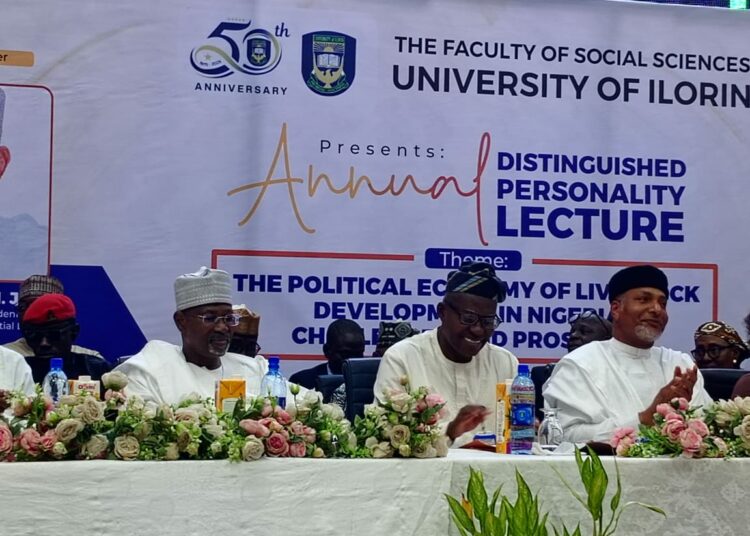Special Adviser to the President and Coordinator of Presidential Livestock Reform, Professor Attahiru Jega, on Monday, described the modernisation of the nation’s livestock sector as a national imperative.
He added that the Nigerian livestock industry, valued at approximately N30 trillion, “can be transformed from chronic underperformance and conflict, into a driver of inclusive growth, social cohesion and long-term food security, through strategic reforms informed by empirical evidence”.
The former INEC chairman stated these while delivering the annual distinguished personality lecture, titled: the Political Economy of Livestock Development in Nigeria: Challenges and Prospects, organised by the Faculty of Social Sciences, University of Ilorin.
Jega, who said that the transformation of the livestock sector must be underpinned by the convergence of statecraft, private enterprise and academic innovation, added that each would contribute to the shared vision of a resilient and prosperous livestock economy.
While projecting that Nigeria’s population will reach nearly 400 million by 2050, positioning it as the third most populous nation globally, Jega added that, “this demographic surge will necessitate a 253% increase in poultry meat, a 117% rise in beef and a staggering 577% expansion in milk production to satisfy domestic consumption requirements.
He, therefore, called for political will and an anticipatory planning and long-term investments in livestock systems, saying without that, “Nigeria risks facing acute protein deficits, heightened food insecurity and intensified pressure on already fragile rural livelihoods”.
Jega, also disclosed that his committee had suggested the establishment of National Livestock Industrial Zones across the six geo-political zones of the country to President Bola Tinubu.
“These zones would be anchored by export-certified abattoirs meeting European Union and ECOWAS standards, dairy processing clusters powered by renewable energy cold chains, and integrated leather industrial parks geared towards value-added manufacturing,” he said.
Jega, whose sub-theme lecture was: “Strategic Reforms for Nigeria’s Livestock Sector: Addressing Farmer-Herder Conflicts, Modernising Production and Unlocking Economic Potentials”, said the measure would also ensure creation of several million jobs and increase the nation’s revenue generation.
He, however, warned that such clustering is not only efficient in reducing post-harvest losses, which currently account for over 30 per cent in meat and dairy, but also serves as a magnet for domestic and foreign investment, citing Ethiopia’s Bishoftu Industrial Park as a tested model from which Nigeria can draw significant lessons.
Jega further canvassed for the institutionalisation of community conflict resolution units to be co-managed by traditional authorities, adding, “Such a framework is projected to reduce farmer-herder clashes by up to 70 per cent within five years, drawing from the successful precedent set by Botswana’s Tribal Grazing Lands Policy.”
“The launch of a nationwide initiative titled Operation Feed Abundance would prioritise the expansion of soya-and maize-based feed mills in strategic feed-producing states such as Niger, Benue, and Kaduna,” he said.
Jega expressed optimism that by 2030, “with the effective implementation of President Tinubu’s livestock reforms initiatives, Nigeria would realistically eliminate open grazing as the dominant mode of cattle production, thereby reduce farmer-herder conflicts by up to 70 per cent, restoring communal harmony and reclaiming thousands of lives and livelihoods lost to violence.
Vice Chancellor of the University of Ilorin, Prof. Wahab Egbewole (SAN) who spoke through the Deputy Vice Chancellor – Management Services, Prof. Fawole Adisa, said the topic for this year’s personality lecture was the school’s declarative support for President Tinubu’s Renewed Hope Agenda.
Earlier, the Dean, Faculty of Social Sciences, Prof. Adedoyin Omeda said the topic for this year was informed by the rising economic and security problems confronting the nation.











